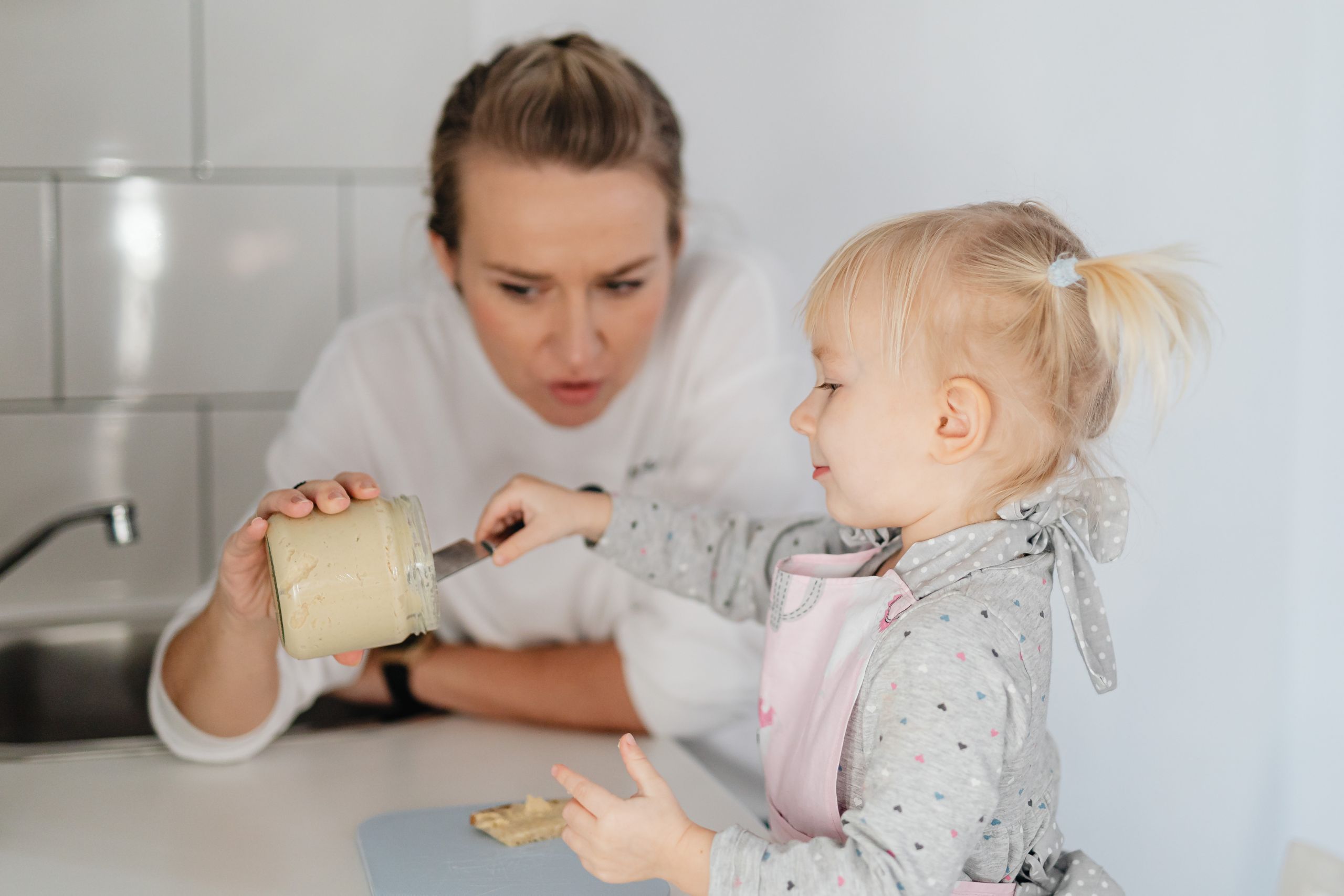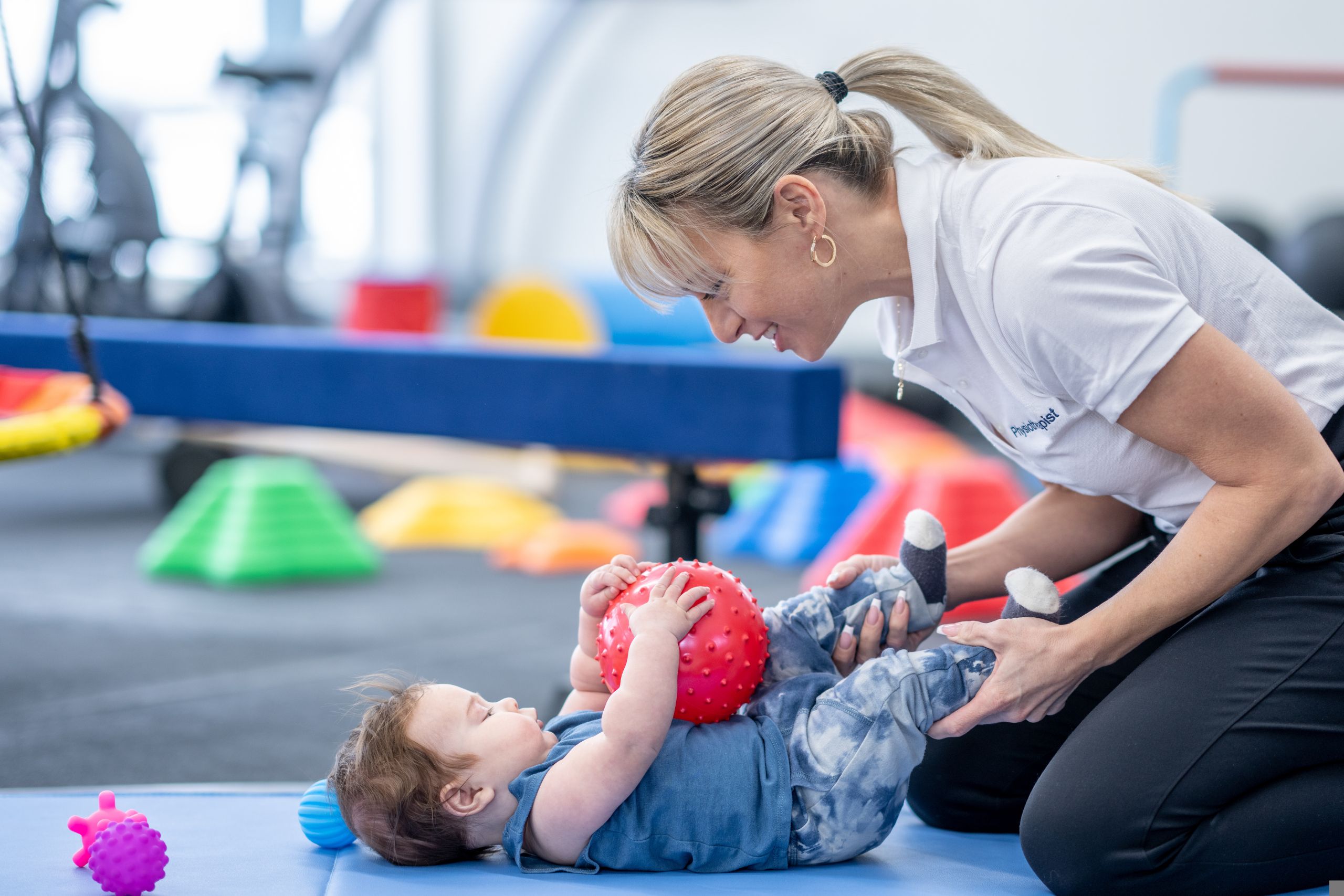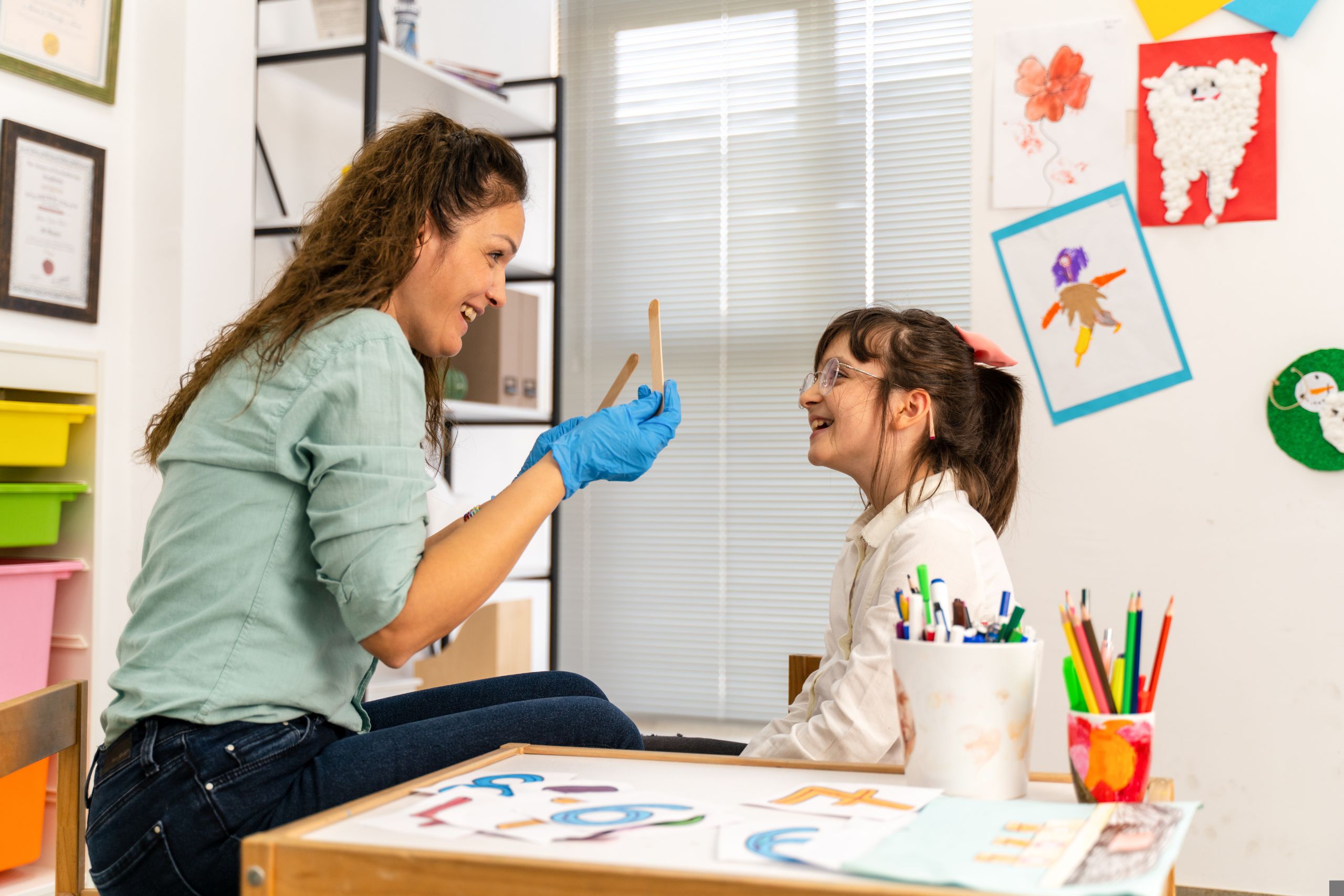Blog
They Hear Me, But Do They Understand Me? A Fort Myers Speech Therapist Explains Receptive vs. Expressive Language
What happens when your child seems to hear you perfectly well, yet doesn’t follow simple directions? Do they look at you blankly after you’ve asked them simple questions, even though you know their hearing is fine? Do they seem to ignore clear directions?
This scenario points to a crucial but often misunderstood aspect of language development: receptive language. At FOCUS Therapy, our Fort Myers speech therapists work frequently with families who are navigating these exact concerns, and we want to help you understand the difference between hearing and comprehending—and why that difference matters so much for your child’s development.
The Difference Between Hearing and Understanding
Let’s start with a common misconception: if a child can hear, they can understand language. Unfortunately, as a Fort Myers speech therapist can explain, it’s not that simple.
Hearing is the physical ability to detect sound. It’s the mechanical process where sound waves enter the ear, vibrate the eardrum, and send signals to the brain. A child with normal hearing can detect when someone is speaking, respond to loud noises, and turn toward sounds.
Receptive language, on the other hand, is the ability to understand and process the meaning of those sounds. It’s about comprehension — making sense of words, following directions, understanding questions, and grasping the concepts being communicated.
Think of it this way: imagine listening to someone speak in a language you’ve never studied. You can hear every word clearly, but you have no idea what they mean. That’s similar to what a child with receptive language difficulties experiences, even in their native language.
This is why a hearing test, while important, doesn’t tell the whole story. A child can pass a hearing screening with flying colors but still struggle significantly with language comprehension.

Receptive Language vs. Expressive Language: What’s the Difference?
When we talk about language development, we’re really talking about two interconnected but distinct skills:
Receptive Language (Understanding)
Receptive language involves:
- Understanding spoken words and sentences
- Following directions (simple and complex)
- Comprehending questions
- Understanding gestures and body language
- Processing information heard in conversations or stories
- Identifying objects, people, or concepts when named
- Understanding concepts like “bigger,” “under,” “first,” or “before”
Expressive Language (Speaking)
Expressive language involves:
- Using words and sentences to communicate
- Asking questions
- Naming objects and people
- Describing experiences or telling stories
- Using proper grammar and sentence structure
- Expressing thoughts, needs, and feelings
- Engaging in back-and-forth conversation
Here’s an important point many parents don’t realize: receptive language typically develops before expressive language. In other words, children usually understand more than they can say. A toddler might understand, “Go get your teddy bear” long before they can say the sentence themselves. This is completely normal.
However, when receptive language is delayed, it creates a ripple effect that touches every aspect of communication and learning.
Why Expressive Language Delays Are Spotted First
It’s much easier for parents and caregivers to notice when a child isn’t talking enough or isn’t using words correctly. Expressive language delays are far more obvious — you can hear (or not hear) the words coming out of your child’s mouth.
If a two-year-old isn’t speaking in two-word phrases or a three-year-old has a very limited vocabulary, parents typically notice and seek help. These delays are tangible and measurable.
Receptive language delays, however, are often much more subtle. A child might:
- Seem to ignore you when you call their name (leading parents to wonder about hearing or defiance)
- Not follow simple directions consistently
- Appear confused during conversations
- Struggle to answer questions
- Have difficulty with pretend play
- Display behavioral issues out of frustration
These signs can easily be misinterpreted as behavioral problems, attention issues, or even hearing loss. Many parents don’t realize their child is struggling to understand language because the child has found ways to compensate—watching what others do and copying them, relying heavily on routine, or using visual cues instead of listening to words.
According to data from the Centers for Disease Control and Prevention, among children aged 3–10 with communication disorders, approximately 13.6% experience language problems, yet many of these issues go undetected or are identified later than they should be. This is partly because receptive language difficulties can be harder to spot than expressive delays.
The Hidden Impact of Receptive Language Delays
While expressive language delays are more immediately noticeable, receptive language difficulties can be equally—or even more—impactful on a child’s development and daily life.
Here’s why:
Academic Challenges
Children with receptive language delays often struggle in school settings where following multi-step directions, understanding lectures, and comprehending written material are essential. Research published in the Archives of Disease in Childhood found that specific language impairment affects 6–8% of children at school entry, and children with receptive language difficulties face particularly challenging long-term outcomes. The study noted that only 3% of children with severe receptive language impairment at school entry had achieved normal language skills six years later, highlighting that receptive difficulties rarely resolve without intervention.
Social Difficulties
Understanding language is crucial for social interaction. Children who can’t fully comprehend what their peers are saying may struggle to make friends, participate in group activities, or understand social cues and humor. This can lead to isolation and reduced self-confidence.
Behavioral Problems
When children can’t understand what’s expected of them, frustration builds. They may appear defiant, uncooperative, or disruptive when in reality, they simply don’t understand the instructions or conversation. This can create tension at home and school.
Safety Concerns
Understanding warnings, instructions, and safety rules is crucial. A child who doesn’t fully comprehend language may not respond appropriately to “Stop!” or “Don’t touch that—it’s hot!”
Limited Learning Opportunities
So much of what children learn comes through verbal instruction and conversation. When receptive language is impaired, every learning opportunity that relies on understanding spoken language becomes less effective.
How a Fort Myers Speech Therapist Can Help
The good news is that with proper identification and intervention, children with receptive language delays can make significant progress. This is where an experienced speech-language pathologist (SLP) becomes an invaluable partner in your child’s development.
Comprehensive Assessment
- Categorized: Speech Therapy
- Tagged: Focus Therapy, Fort Myers speech therapy, speech therapists, speech therapy
Fort Myers ABA Therapists on Creating Effective Routines for Children with Developmental Delays
Our Fort Myers ABA therapists understand that when your child has a developmental delay, every day can feel unpredictable. Transitions become battles. Mealtime turns into a power struggle. Bedtime stretches into hours of frustration. As parents, you’re not just managing schedules—you’re navigating a world that feels chaotic for both you and your child.
But here’s something our Fort Myers ABA therapists have learned through years: structured routines aren’t just helpful for children with developmental delays—they can be transformative. The right routines don’t restrict your child’s world; they open it up by creating the predictability and security that allows them to thrive.
Why Routines Matter More for Children with Developmental Delays
Children with developmental delays often struggle with executive functioning skills—the mental processes that help us plan, focus attention, remember instructions, and juggle multiple tasks. When the world feels unpredictable, their nervous systems go into overdrive, leading to increased anxiety, meltdowns, and challenging behaviors.
Research backs this up powerfully. A comprehensive systematic review published in the Journal of Family Theory & Review found that routines are consistently associated with positive developmental outcomes in children, including improvements in cognitive skills, self-regulation, social-emotional development, and overall mental and physical health. Perhaps most significantly, the study emphasizes the protective power of routines in challenging environments—exactly where many of our families find themselves.
At FOCUS Therapy, we see this evidence come to life every day in our Fort Myers ABA therapy sessions. When families implement consistent routines, we witness remarkable changes: fewer meltdowns, smoother transitions, increased independence, and—perhaps most importantly—happier, more confident children.
The Science Behind Predictability
Think about your own morning routine. You probably don’t consciously think about each step—brushing your teeth, making coffee, getting dressed. These automatic sequences free up your mental energy for more complex tasks. For children with developmental delays, creating these automatic sequences is harder, but even more critical.
When routines are consistent, children learn what comes next. This predictability reduces anxiety because their brains don’t have to constantly process new information or anticipate surprises. The neural pathways strengthen with repetition, making tasks that once seemed impossible gradually become manageable, then eventually automatic.
We at the FOCUS Therapy ABA Therapy team have observed that children who struggle with verbal communication often show the most dramatic improvements with routine implementation. When they know the sequence of events, they can participate more fully even if they can’t verbally express their needs.
Building Routines That Actually Work
- Categorized: Articles
Early Signs of Autism in Toddlers: What Parents Often Notice First
As parents watch their children grow and develop, they naturally celebrate each milestone—first smiles, first words, first steps. But sometimes, parents begin to notice differences in how their child interacts with the world around them. These observations, though sometimes subtle, can be the first indicators of autism spectrum disorder (ASD).
At FOCUS Therapy in Fort Myers, our Board Certified Behavior Analysts (BCBAs) and multidisciplinary therapy team work with families every day who are navigating these early concerns. Understanding what early signs of autism to look for —and knowing that early intervention can make a meaningful difference—empowers parents to take the next steps with confidence and hope.
The Parent’s Perspective: Trust Your Instincts
Parents are often the first to notice when something feels different about their child’s development. These observations aren’t about comparison or judgment. They’re about knowing your child and recognizing patterns that don’t quite fit what you expected. The signs of autism in toddlers can vary widely from child to child, but certain behaviors tend to emerge during the toddler years that prompt parents to seek guidance.
Social Communication Differences
One of the earliest and most common concerns parents express involves social communication. Research indicates that children who are later diagnosed with autism often show differences in how they engage socially from as early as six months of age.
Eye Contact and Social Attention
Many parents report that their toddler seems less interested in looking at faces or making eye contact during interactions. According to recent peer-reviewed research, young children with autism may display reduced eye contact, decreased response to their name, and less frequent social smiling compared to typically developing peers. These differences in social attention can affect how children connect with caregivers and learn from their environment.
Response to Name
A particularly telling sign that parents frequently notice is when their toddler doesn’t consistently respond when their name is called. While all young children can be absorbed in play and momentarily tune out the world, children with autism may show a persistent pattern of not turning or looking when called, even in quiet settings.

Joint Attention
Joint attention—the ability to share focus on an object or event with another person—is a crucial building block for language and social development. Parents might notice that their toddler doesn’t point to show them interesting things, doesn’t follow when the parent points to something, or doesn’t seem interested in sharing experiences. Research shows that difficulties with joint attention can be observable as early as 12 months and are often one of the more reliable early indicators of autism.
Communication and Language Patterns
Delayed or Atypical Language Development
While language delays alone don’t indicate autism, parents often express concern when their child isn’t babbling by their first birthday, doesn’t have words by 16 months, or loses words or skills they once had. Some children with autism may develop language but use it in unusual ways—repeating phrases from videos verbatim (echolalia) or speaking in a sing-song voice.
Reduced Vocalizations
Research has found that infants later diagnosed with autism may show atypical vocalization patterns, including reduced canonical babbling and fewer socially directed vocalizations during the first year of life. Parents might notice their baby seems quieter than expected or doesn’t engage in the typical back-and-forth “conversation” of coos and babbles.
Behavioral Patterns and Interests
Repetitive Behaviors
Parents frequently observe repetitive movements or behaviors—hand flapping, spinning, rocking, or lining up toys in precise patterns rather than engaging in imaginative play. While many young children enjoy repetition and routine, the intensity and persistence of these behaviors in children with autism often stands out.
Intense or Unusual Interests
Some toddlers develop intense fascinations with specific objects or topics—vacuum cleaners, ceiling fans, letters, or numbers. While strong interests are normal in development, the singular focus and resistance to shifting attention to other activities can be a distinguishing feature.
Sensory Sensitivities
Many parents notice their child reacts strongly to sensory experiences—becoming distressed by certain sounds, textures, or lights, or conversely, seeming to under-respond to sensory input like pain or temperature. As noted in current research, sensory sensitivities can be identified as early as eight to ten months and become increasingly predictive of autism diagnosis between 12 and 24 months.
Motor Development Considerations
10 Questions Parents Should Ask Their Child’s FOCUS Therapy Team
As a parent, you are your child’s most important advocate. When your child begins therapy—whether it’s occupational therapy, speech therapy, ABA therapy or a combination of services—you’re entering into a partnership with professionals who are here to support your family’s unique journey.
At FOCUS Therapy in Fort Myers, FL, we believe that open communication between parents and therapists isn’t just helpful—it’s essential. The best outcomes happen when families feel empowered to ask questions, share observations, and actively participate in their child’s care. Yet many parents tell us they’re not sure what to ask or worry about “bothering” the therapy team.
Here’s the truth: There are no silly questions. Your insights about your child are invaluable, and your concerns deserve to be heard. To help you make the most of your partnership with your therapy team, we’ve put together ten important questions every parent should feel comfortable asking—not just at the beginning, but throughout your child’s therapy journey.
1. “What are we working toward, and how will we know when we get there?”
Every therapy journey should have a destination. Ask your child’s therapist to explain both the short-term and long-term goals for your child in language that makes sense to you. What specific skills are you targeting? How will you measure progress? Understanding the “why” behind each activity helps you recognize growth and reinforces goals at home.
Follow-up questions to consider:
- How long do you anticipate it will take to reach these goals?
- What does success look like for my child specifically?
2. “How can I support my child’s therapy goals at home?”
Therapy doesn’t end when the session is over. The most meaningful progress often happens through everyday moments—mealtime, bedtime routines, playtime, and more. Your therapist can suggest simple, practical ways to integrate therapy strategies into your daily life without it feeling like “homework.”
This might look like special games, positioning tips, communication strategies, or sensory activities that fit naturally into your family’s routine.
3. “Can you explain what you’re doing and why?”
Therapy activities might look like “just playing,” but there’s always intentionality behind what we do. Don’t hesitate to ask your therapist to break down the purpose of specific exercises or interventions. Understanding the reasoning helps you become a more effective partner in your child’s care.
For example, that obstacle course isn’t just fun—it might be building motor planning, bilateral coordination, and body awareness. That bubble activity? It could be targeting oral motor skills, breath control, and turn-taking.

4. “What challenges or behaviors are you seeing, and how should I handle them at home?”
Your child may behave differently in therapy than they do at home (or vice versa). Regular conversations about what your therapist observes can help you both piece together patterns and develop consistent strategies.
Maybe your child is demonstrating frustration tolerance during challenging tasks, or perhaps they’re avoiding certain sensory experiences. These observations are valuable data points that help everyone on the team support your child more effectively.
5. “Is my child making progress? What does that look like?”
Progress isn’t always linear, and sometimes it’s measured in ways you might not expect. Some weeks might show big leaps forward, while others focus on maintaining skills or working through challenges. Ask for specific examples of progress—no matter how small—so you can celebrate wins together.
If progress seems slow or stalled, this is also an important conversation to have. Your therapist can explain what might be happening and whether adjustments to the treatment plan are needed.
6. “Are there any concerns I should be aware of?”
Helping Kids Who Struggle with Transitions: OT Tools That Work
Every parent has been there: the meltdown when it’s time to leave the playground, the resistance when turning off the TV, or the tears that come with switching from one activity to another. But for some children, these transition moments aren’t just difficult—they’re genuinely overwhelming. When transitions consistently trigger big emotions, behavioral outbursts, or shutdowns, Fort Myers occupational therapy from FOCUS Therapy can offer practical tools and strategies that make a real difference.
Why Transitions Are So Hard for Some Kids
Before diving into solutions, it helps to understand why transitions pose such a challenge for certain children. From an occupational therapy perspective, successful transitions require multiple skills working together:
Sensory processing plays a huge role. When children are deeply engaged in an activity, their sensory systems are fully activated. Suddenly stopping means their nervous system must shift gears quickly, which can feel jarring or even physically uncomfortable for kids with sensory processing differences.
Executive functioning skills are equally important. Transitions demand that children stop one task, hold information in working memory, shift their attention, and initiate a new activity. For kids with developing or challenged executive function, this cognitive juggling act can be exhausting.
Emotional regulation is the final piece of the puzzle. When children struggle with the cognitive and sensory demands of transitions, they often don’t have the emotional bandwidth left to manage their feelings about the change. This is when parents see the tears, tantrums, or complete refusals.
Children with ADHD, autism spectrum disorder, sensory processing disorder, anxiety, or other developmental differences often find transitions particularly challenging—but any child can struggle with change, especially during times of stress or when routines are disrupted.
Visual Supports: Making the Invisible Visible
One of the most powerful occupational therapy tools for transitions is making time and expectations visible. Children process information differently than adults, and many are visual learners who benefit from seeing what’s coming next.
Visual schedules transform abstract concepts like “later” or “soon” into concrete images children can understand. A simple picture schedule showing the day’s activities—breakfast, school, park time, dinner, bath, bedtime—gives children a roadmap. They can see where they are in the day and what’s coming next, which reduces anxiety and builds predictability.
For younger children or those with limited reading skills, photographs or simple drawings work beautifully. For older kids, written schedules with checkboxes can be effective and give them a sense of accomplishment as they move through the day.
Timers are another visual support that works wonders. Time is an abstract concept for children, making warnings like “five more minutes” relatively meaningless. A visual timer that shows time disappearing (through color draining away or numbers counting down) helps children actually see how much time they have left. The Time Timer is a popular choice among occupational therapists, but even a simple kitchen timer or smartphone timer can work.
The key is giving children multiple warnings: “We have ten minutes before we leave,” followed by “five minutes,” then “two minutes,” and finally “one minute—time to wrap up.” This graduated approach gives their brain time to prepare for the shift.
First-Then boards simplify transitions by showing exactly what needs to happen. These boards show two images: “First we clean up, then we have snack.” This visual contract helps children understand that they’ll get to the preferred activity after completing the non-preferred one. It’s concrete, clear, and eliminates power struggles.
Sensory Strategies: Smoothing the Nervous System Shift
Since transitions can be sensory challenges, incorporating sensory strategies before and during transitions can help children regulate their nervous systems.
Transition objects provide sensory continuity during changes. This might be a favorite small toy, a fidget, a soft fabric square, or even a special bracelet. Having something familiar and comforting to hold during transitions helps children feel anchored while everything else changes around them.
Heavy work activities are occupational therapy gold for transitions. Heavy work means any activity that engages muscles and joints—pushing, pulling, carrying, or lifting. These activities have a naturally calming effect on the nervous system. Before a tricky transition, try having children:
- Push against a wall for 10 seconds
- Carry heavy books or a laundry basket
- Do five jumping jacks or wall push-ups
- Help push the grocery cart
- Carry their backpack or a stack of items
This proprioceptive input (sensation from muscles and joints) helps organize the nervous system and makes transitions feel less overwhelming.
Movement breaks between activities acknowledge that children need to release energy before settling into something new. A quick dance party, animal walks across the room, or jumping on a trampoline for two minutes can reset their system and make the next activity more successful.
Routine and Predictability: The Foundation of Smooth Transitions

Children thrive on predictability. When they know what to expect, their brains can relax instead of staying on high alert for surprises.
Consistent routines are perhaps the most important OT tool for transitions. When morning routines, mealtime routines, and bedtime routines follow the same sequence every day, they become automatic. Children’s brains no longer have to work hard to figure out what comes next—they already know.
- Categorized: Occupational Therapy
- Tagged: Fort Myers occupational therapist, Fort Myers occupational therapy, occupational therapy
Why You Want to Work at FOCUS Therapy: Where Passion Meets Purpose
Are you searching for more than just a job? Do you want to join a team where every day brings the joy of watching children overcome challenges and reach their fullest potential? If you’re a speech therapist, speech-therapy assistant, occupational therapist, occupational therapy assistant, behavioral analyst, registered behavior technician or support staff member looking for your next career move, FOCUS Therapy in Fort Myers, Florida, might just be the perfect fit.
What Makes FOCUS Different: It’s All About Family
At FOCUS Therapy, the acronym says it all: Follow Our Course Until Successful. But what truly sets this pediatric clinic apart isn’t just our commitment to success—it’s the genuine family atmosphere that permeates every corner of our practice.
“The children are always excited to come to therapy and the therapists are passionate and caring,” according to employee reviews. This enthusiasm isn’t accidental; it’s cultivated by a team that truly believes in their mission and genuinely loves what they do.
As one team member put it: “We truly are one big family. I love learning from other therapists and disciplines within FOCUS. That is something that really makes this place so special and unique.”
The Power of Multidisciplinary Collaboration

One of the most compelling aspects of working at FOCUS is our commitment to a multidisciplinary approach. Owner Jennifer Voltz-Ronco emphasizes our, “very caring and compassionate therapists who love their job and these children,” with a focus on play-based therapies that are also evidence-based.
This collaborative environment means you’re not working in isolation. Whether you’re a speech-language pathologist, occupational therapist, or behavioral analyst, you’ll be part of a team that recognizes how interconnected a child’s development truly is. As R. Haber, MS/CCC-SLP, shares: “It’s awesome how close everyone here is and how well we all work together. Everyone is always willing to lend a helping hand, collaborate, and give these kids the best therapy possible.”
Competitive Benefits That Show We Value You
FOCUS Therapy understands that great therapists deserve great benefits. Our clinic offers competitive pay, great benefits for medical, dental and vision, independent contractor status with flexibility to set your own schedule, no productivity quotas to meet, and no mandatory work on nights or weekends. We even provide sign-on bonuses, free training, and relocation assistance for in-demand positions.
But perhaps most importantly, we respect your professional autonomy. We foster independence among our patients, as well as among our family of professionals. Your personal and health care choices (including vaccines) are all your own.
A Workplace Where Fun Meets Effectiveness
The magic of FOCUS lies in our ability to make therapy both fun and incredibly effective. Employees consistently highlight that “the best part about working at FOCUS Therapy is using play based therapy to teach children.” This isn’t just about making work enjoyable—though it certainly does that—it’s about recognizing that children learn best when they’re engaged and having fun.
J. Higginbotham, OTR, captures this philosophy perfectly: “I love how … everything is fun! I love the creativity and imagination. Every day is different. WE spend our days playing, dancing, moving, and creating fun activities based on each child’s needs.”
Professional Growth and Support
At FOCUS, professional development isn’t an afterthought—it’s integral to our culture. The small clinic environment means you’ll have direct access to experienced colleagues across multiple disciplines. We pride ourselves on being welcoming, conveniently-located and fully-equipped with friendly staff who create a supportive environment.
Whether you’re a new graduate just starting your career or an experienced professional looking for a change, FOCUS welcomes both. Their emphasis on mentorship and collaboration ensures that you’ll continue growing throughout your tenure.
Making a Real Difference Every Day
Perhaps the most rewarding aspect of working at FOCUS is the tangible impact you’ll have. Parents consistently praise the genuine love our therapists show for these children, noting “huge changes” in their children’s development. Parents describe FOCUS therapists as “compassionate,” “patient,” and “dedicated”—qualities that make the clinic particularly effective.
When you work at FOCUS, you’re not just providing therapy; you’re changing lives, supporting families, and helping children reach their highest potential across all areas of development.
Ready to Join the FOCUS Family?
If you’re ready to be part of a team where passion meets purpose, where collaboration drives success, and where every day brings the opportunity to make a meaningful difference in a child’s life, FOCUS Therapy wants to hear from you!
We’re currently seeking speech therapists (SLPs and SLPAs), physical therapists (PTs, DPTs, PTAs), occupational therapists (OTs, OTAs), behavioral analysts (BCBAs, RBTs), and experienced office staff.
Ready to take the next step in your career? Submit your application today and discover why so many professionals have chosen to make FOCUS Therapy their professional home. Join a team where you’ll love coming to work, where children always come first, and where success is truly a team effort.
Contact FOCUS Therapy at [email protected] or call (239) 313-5049 to learn more about current opportunities.
Helping Children Generalize Skills From Fort Myers Speech Therapy to Daily Life
As parents, there’s nothing quite like the moment when you hear your child successfully use a speech sound they’ve been working on in therapy—not just during practice sessions, but while chatting with grandparents, ordering at a restaurant, or playing with friends. This magical transfer of skills from the therapy clinic to real life is what we call “generalization.” It’s the ultimate goal of every Fort Myers speech therapy session here at FOCUS Therapy.
Understanding Generalization: The Bridge Between Learning and Living
Generalization occurs when children take the speech skills they’ve learned in structured therapy sessions and successfully apply them in their everyday conversations. Think of it as building a bridge between the controlled environment of therapy and the dynamic, unpredictable world of daily communication.
At our Fort Myers speech therapy clinic, we see this challenge daily. A child might articulate the “r” sound perfectly during drills with their speech-language pathologist (SLP), but struggle to remember it when excitedly telling their mom about their school day. This gap between clinical success and real-world application is completely normal—and something our multidisciplinary team is specifically trained to address.
Why Generalization Can Be Challenging
Children’s brains are remarkable learning machines. They’re also creatures of context. When speech skills are learned in one specific setting (like our therapy room), the brain initially files that information as belonging to that particular environment.
Several factors can make generalization more difficult:
- Cognitive Load. In real conversations, children are simultaneously thinking about what they want to say, how to say it, social cues, and their speech targets. That’s a lot for developing minds to juggle simultaneously.
- Emotional Factors. Therapy sessions are supportive and structured, while daily interactions can be exciting, frustrating, or stressful—all of which can impact a child’s ability to remember their speech goals.
- Lack of Consistent Practice. Without intentional carryover activities, children may not get enough opportunities to practice their new skills in varied contexts.
Evidence-Based Strategies That Make a Difference
Research consistently shows that involving parents in the therapy process significantly improves generalization outcomes. Involving parents within the intervention process has the potential to increase maintenance and generalization of targets, as families can incorporate therapeutic techniques and targets within everyday communicative contexts (Bowen & Cupples, 2004; Roberts & Kaiser, 2011).
Our Fort Myers speech therapy team at FOCUS implements several proven strategies to help children transfer their skills:
1. Systematic Practice Across Environments
We don’t just practice sounds in isolation—we embed them into activities that mirror real-life situations. During therapy, we might practice ordering food, asking for help, or describing favorite toys. This helps children’s brains understand that these skills belong everywhere, not just in the therapy room.
2. Parent Partnership and Training
One of the most powerful tools in promoting generalization is you, the parent. Our SLPs provide specific training on how to support your child’s speech goals during everyday activities.
This might include:
- Learning simple cueing techniques to remind your child of their target sounds.
- Understanding how to provide positive reinforcement without overcorrecting.
- Identifying natural opportunities throughout the day for practice.
- Creating supportive communication environments that encourage success.
3. Gradual Release of Responsibility
We systematically reduce the amount of prompting and support we provide, gradually transferring responsibility to your child. This might start with our SLP providing immediate feedback, then moving to delayed feedback, then to self-monitoring, and finally to independent use.
4. Functional Communication Focus
Rather than just practicing sounds in lists, we work on communication that matters to your child. If your 5-year-old loves dinosaurs, we’ll practice their target sounds while discussing T-Rex and Triceratops. When speech practice connects to a child’s interests and needs, generalization happens more naturally.
Practical Tips for Parents to Support Generalization at Home
As part of our multidisciplinary approach at FOCUS Therapy, we collaborate closely with families to create comprehensive support systems. Here are some practical strategies you can implement:
Create Natural Practice Opportunities
- During car rides, play “I Spy” games focusing on your child’s target sounds
- While cooking together, narrate activities using target words
- Read books that feature your child’s speech goals
- Turn household chores into speech practice games

Use the “Sandwich” Approach
When your child makes a speech error, try this gentle correction method:
- Acknowledge what they said (“Oh, you said you want the wed crayon!”)
- Model the correct production (“Here’s the RED crayon”)
- Give them a chance to try again without pressure
Celebrate Progress, Not Perfection
Remember that generalization is a process, not an event. Celebrate when your child remembers to use their target sound at home—that’s real progress! Perfectionism can create anxiety that actually hinders generalization.
Stay Consistent with Homework
Our SLPs can provide patient parents with specific at-home practice activities designed to bridge therapy and daily life. Consistency with these activities, even just being intentional with 5-10 minutes of your daily interaction with your child can make a significant difference in generalization outcomes.
A Team Approach to Fort Myers Speech Therapy
What sets our Fort Myers speech therapy services apart at FOCUS is our collaborative, multidisciplinary approach. Our speech-language pathologists work closely with occupational therapists and behavior analysts to address the whole child. Sometimes a child’s difficulty with generalization isn’t just about speech—it might be related to attention, sensory processing, or behavioral factors.
For example, if a child struggles to remember their speech goals during exciting activities, our occupational therapist might work on self-regulation skills, while our behavior analyst helps develop strategies for maintaining focus during high-stimulation situations. This comprehensive approach often leads to more robust generalization than speech therapy alone.
When to Expect Results
- Categorized: Articles
Why Early Intervention Matters More Than You Think
As a parent, receiving an autism spectrum disorder (ASD) diagnosis for your child can feel overwhelming. The mix of emotions – worry, uncertainty, and perhaps even relief at finally having answers – is completely natural. At FOCUS Therapy, we understand that this moment marks the beginning of a journey that may seem daunting at first. However, we want you to know that there has never been a more hopeful time to begin this journey with your child.
The Changing Landscape: Less Stigma, More Understanding
One of the most encouraging changes we’ve witnessed over the past decade is the dramatic shift in how society views autism and developmental differences. The stigma that once surrounded autism diagnoses has significantly diminished, replaced by greater awareness, acceptance, and understanding. Today’s schools, communities, and workplaces are more inclusive than ever before. Major corporations actively recruit neurodivergent individuals, recognizing their unique strengths and contributions. Television shows, books, and public figures openly celebrate neurodiversity, helping to create a world where your child can truly thrive as their authentic self.
This cultural shift means that starting therapy today isn’t about “fixing” your child – it’s about giving them the tools they need to navigate the world successfully while celebrating their unique perspective and abilities.

The Science Behind Early Intervention: Why Timing Matters
The most important gift you can give your child right now is early intervention, and the research overwhelmingly supports this approach. The human brain exhibits remarkable plasticity during early childhood, with neural connections forming at an astonishing rate. During early childhood, there are 50 percent more connections between neurons than exist in the adult brain, creating an optimal window for learning and development.
Research in neurodevelopmental science has revealed that early intervention can mitigate the severity of core and associated features of autism, improve the long-term outcome of treated patients, and even reverse some of the ASD symptoms. This isn’t just hopeful thinking – it’s evidence-based science that gives us tremendous optimism for your child’s future.
The Evidence for ABA-Based Early Intervention
Applied Behavior Analysis (ABA) has been extensively studied and proven effective for children with autism spectrum disorders. A comprehensive meta-analysis published in BMC Psychiatry found that comprehensive ABA-based interventions showed medium effects for intellectual functioning and adaptive behavior when compared to minimal or no treatment. These improvements aren’t just statistical measures – they translate into real-world gains in your child’s ability to communicate, learn, and connect with others.
The research consistently shows that ABA results in small to moderate improvement in adaptive behavior, including socialization, communication, and expressive language, following a dose-response relationship with number of ABA intervention hours. This means that the more comprehensive and consistent the intervention, the greater the potential benefits for your child.
Understanding Brain Plasticity and Critical Periods
The concept of “critical periods” in brain development is crucial to understanding why early intervention is so powerful. During these windows of heightened neuroplasticity, the brain is extraordinarily receptive to learning and adaptation. The neuroplastic period of interest normally extends into adolescence, allowing for neural integration and the development of language and social skills.
When we provide structured, evidence-based intervention during these critical periods, we’re essentially helping your child’s brain create new pathways and strengthen existing ones. This is why children who receive early intervention often make remarkable progress that might not be possible if treatment begins later.
What Early Intervention Looks Like in Practice
At FOCUS Therapy, early intervention isn’t a one-size-fits-all approach. Our comprehensive assessment process helps us understand your child’s unique strengths, challenges, and learning style. We then develop an individualized treatment plan that may include:
- Applied Behavior Analysis (ABA): Our evidence-based ABA program focuses on teaching functional skills while reducing challenging behaviors. We use positive reinforcement and systematic teaching methods to help your child learn everything from basic communication to complex social interactions.
- Communication and Language Development: Many children with autism benefit from structured language intervention that builds both receptive and expressive communication skills. Our speech therapists work on everything from first words to complex conversations, adapting our approach to your child’s communication style.
- Social Skills Training: Learning to navigate social situations is crucial for long-term success. All of our therapies incorporate social skills learning to teach children how to make friends, understand social cues, and participate meaningfully in group activities.
- Daily Living Skills: Independence in daily activities builds confidence and prepares children for future success. Our occupational therapists work on skills like self-care, following directions, and following routines.

The Power of a Multidisciplinary Approach
One of the significant advantages of working with a comprehensive pediatric therapy clinic like FOCUS Therapy is access to a full team of specialists under one roof. Your child might benefit from multiple types of therapy, and having seamless coordination between providers makes all the difference.
Our multidisciplinary team includes:
- Board Certified Behavior Analysts (BCBAs) who design and oversee ABA programs, and RBTs who carry them out
- Speech-Language Pathologists who address communication challenges
- Occupational Therapists who work on sensory processing and fine motor skills
This collaborative approach ensures that all aspects of your child’s development are addressed simultaneously, creating synergistic effects that accelerate progress.
Real Progress, Real Hope
The children we see at FOCUS Therapy consistently demonstrate that early intervention works. We’ve witnessed nonverbal children develop language skills, seen socially withdrawn children learn to play with peers, and watched families discover joy and connection they didn’t think was possible.
The key is understanding that progress might look different for each child, but it’s always meaningful. One child might master academic skills and go on to attend college, while another might develop the self-advocacy skills needed to live independently. Both outcomes represent tremendous success because both children are reaching their full potential.
Supporting Your Family Through the Journey
We recognize that early intervention isn’t just about your child – it’s about supporting your entire family system. Parents often need time to process the diagnosis, learn new skills, and adjust their expectations and dreams. This is a normal part of the journey, and we’re here to support you every step of the way.
We emphasize parent training so you can employ these same principles and practices at home, extending your child’s learning opportunities throughout the day. We also connect families with resources, support groups, and other parents who understand the journey you’re on.
The Investment That Changes Everything
Starting early intervention requires a significant investment of time, energy, and resources, but it’s an investment that pays dividends for a lifetime. The skills your child learns now become the foundation for everything they’ll accomplish in the future – their relationships, education, career, and independence.
Research consistently shows that children who receive intensive early intervention require fewer services later in life, achieve greater independence, and experience better quality of life outcomes. In many ways, early intervention is the most cost-effective and impactful decision you can make for your child’s future.
Moving Forward with Confidence
If you’re reading this article because you’re considering early intervention for your child, we want you to know that you’re already taking the most important step – seeking information and advocating for your child’s needs. The fact that you’re here, researching and learning, demonstrates your commitment to your child’s success!
The journey ahead may have challenges, but it’s also filled with incredible moments of growth, discovery, and joy. Every small milestone – the first intentional word, the spontaneous smile, the successful social interaction – becomes a celebration of your child’s unique potential.
At FOCUS Therapy in Fort Myers, we’re honored to walk alongside families during this crucial time. Our team brings decades of experience, evidence-based practices, and genuine compassion to every interaction. We believe in your child’s potential, and we’re here to help unlock it.
Remember, starting early intervention isn’t just about addressing challenges – it’s about building on strengths, fostering independence, and creating a foundation for a fulfilling life. Your child has incredible potential, and with the right support, there’s no limit to what they can achieve.
Even if you’re feeling a little behind on the process, consider that: the best time to plant a tree was 20 years ago, but the second-best time is now. The same principle applies to early intervention – while we can’t change the past, we can start building a brighter future today.
FOCUS offers Fort Myers speech therapy, ABA therapy, occupational therapy, and ADOS testing. Call (239) 313.5049 or Contact Us online.
Additional Resources:
Comprehensive ABA-based interventions in the treatment of children with autism spectrum disorder – a meta-analysis, 2023, Eckes et al, BMC Psychiatry
Blog:
- Categorized: Behavior Therapy, Occupational Therapy, Speech Therapy
- Tagged: ABA therapy, Focus Therapy, Fort Myers speech therapy, occupational therapy, speech therapy
Family-Friendly Sensory-Friendly Activities in Fort Myers, FL
As pediatric therapists specializing in ABA therapy, occupational therapy, and speech therapy, we at FOCUS Therapy understand that every child experiences the world differently through their senses. In Southwest Florida, we’re fortunate to have a growing number of sensory-friendly activities and venues that welcome children of all abilities. Whether your child is neurotypical, has autism spectrum disorder, ADHD, or other developmental differences, finding the right sensory environment can make all the difference in creating positive family experiences.
Understanding Sensory-Friendly: What Does It Really Mean?
Before diving into our favorite Fort Myers activities, it’s important to understand what “sensory-friendly” actually means. A sensory-friendly environment is one that has been intentionally modified to reduce overwhelming sensory input while still providing engaging experiences.
This typically includes:
- Lower lighting levels to reduce visual overwhelm.
- Reduced noise levels or elimination of sudden, loud sounds.
- Comfortable spaces for children who need breaks or quiet time.
- Flexible participation allowing children to engage at their own pace.
- Staff training to understand and support diverse sensory needs.
- Clear communication about what to expect during activities.
These modifications don’t take away from the fun—they simply make experiences accessible to more children and families.
The Importance of Supporting Your Child’s Sensory Diet
As occupational therapists, we frequently discuss “sensory diets” with families. A sensory diet isn’t about food—it’s a personalized schedule of sensory activities designed to help children maintain optimal arousal and attention throughout their day. Research demonstrates that sensory diets can significantly improve classroom task performance and psychosocial functioning when developed in consultation with occupational therapists.
Think of sensory input like nutrition for the nervous system. Just as we need balanced meals throughout the day, children need balanced sensory experiences. Some children crave intense sensory input (proprioception through jumping, spinning, or deep pressure), while others are easily overwhelmed and need calming activities (soft lighting, gentle music, or weighted blankets). Understanding your child’s unique sensory profile helps you choose activities that will be both enjoyable and regulating.
Top Sensory-Friendly Destinations in Fort Myers
Alliance for the Arts
Location: 10091 McGregor Blvd, Fort Myers, FL 33919

Every third Saturday from 10 a.m. to noon, the Alliance for the Arts hosts a free Family ArtLab!, which welcomes families and kids of all abilities for hands-on art projects, gallery activities, games, and more. The center has made significant efforts to ensure their programs are inclusive and accessible.
Sensory Benefits: Art activities provide tactile input and can be incredibly calming. The predictable schedule and welcoming atmosphere help children who thrive with routine and clear expectations.
Calusa Nature Center
Location: 3450 Ortiz Avenue, Fort Myers, FL 33905
The Sensory Sunday programs provide a more controlled environment for children who might find the regular nature center experience overwhelming. The staff modifies their usual programming to accommodate various sensory needs while still providing educational opportunities about local wildlife and ecosystems.
This includes sensory-friendly planetarium shows, which are limited to 50 audience members at a time. The lights remain on, but dimmed, the sound is turned down, and the theatre doors are open so people can move around as needed. Guests are welcome to “chill out” in the lobby, and there’s a short break between the main show and the star talk, so each group can attend (or not) — whatever is best for their needs. Sensory toys are also available upon request.
Sensory Benefits: The nature center’s outdoor trails provide natural sensory input through different textures (wooden boardwalks, dirt paths), sounds (birds, rustling leaves), and visual experiences (native plants, wildlife). The modified programming during Sensory Sundays ensures these experiences are presented in a more predictable, less overwhelming format.
Tips for Success:
- Use the boardwalk trails for proprioceptive input through walking on different surfaces
- Arrive early to allow your child time to acclimate to the environment
- Explore the butterfly garden for gentle visual and auditory sensory input
Laboratory Theater of Florida
Location: 1634 Woodford Ave, Fort Myers, FL 33907
The Laboratory Theater of Florida began offering sensory-friendly performances of many of its Fort Myers shows last year. Sensory-friendly performances feature lower sound and light levels (with all strobe light effects removed) and house lights that stay on low throughout the performance.
Sensory Benefits: These modifications make theater accessible to children who might otherwise find traditional performances overwhelming, while still providing rich auditory and visual experiences in a controlled environment.
Fort Myers Beach

The wide, sandy beaches of Fort Myers provide natural sensory experiences that many children find regulating. The repetitive sound of waves, the tactile experience of sand, and the vast open space can be calming for children who need proprioceptive input or feel overwhelmed in crowded indoor spaces.
Tips for Success:
- Visit during off-peak hours for less crowding
- Bring sensory tools like fidgets or noise-canceling headphones
- Have a plan for sandy textures if your child has tactile sensitivities
Manatee Park
This peaceful park offers opportunities for wildlife viewing in a calm, natural environment. The predictable layout and gentle sensory input make it ideal for children who prefer quieter activities.
IMAG History & Science Center
While not specifically marketed as sensory-friendly, IMAG offers hands-on exhibits that provide excellent tactile and visual sensory experiences. The aquarium’s gentle lighting and flowing water create a naturally calming environment.
Creating Sensory-Friendly Experiences at Home and in the Community
As a multidisciplinary therapy team, FOCUS Therapy encourages families to advocate for sensory-friendly modifications wherever they go.
Here are some strategies:
Before You Go:
- Call ahead to discuss your child’s needs
- Ask about quieter times to visit
- Inquire about sensory break spaces
- Request information about lighting and sound levels

Bring Your Toolkit:
- Noise-canceling headphones or earplugs
- Favorite fidget toys or sensory tools
- Weighted lap pad or compression vest
- Snacks that provide oral sensory input (crunchy or chewy foods)
Communication Strategies:
From our speech therapy perspective, preparing children for new sensory experiences through social stories, visual schedules, or role-play can significantly improve their ability to participate successfully. Ask your child’s speech therapist for tips specific to your child, and we’ll be happy to help!
The ABA Approach to Sensory-Friendly Outings
Our ABA therapists recommend breaking down sensory-friendly outings into manageable steps. Start with shorter visits during less busy times, gradually building up your child’s tolerance and positive associations. Use reinforcement strategies by pairing preferred sensory experiences with new or challenging ones.
Consider creating a visual schedule showing the sequence of activities, including planned sensory breaks. This predictability helps children feel more secure and regulated throughout the outing.
Building Community Awareness
We’re encouraged by the growing awareness of sensory needs in our Fort Myers community. Many local businesses are beginning to understand the importance of creating inclusive environments. As families, you can help by:
- Thanking businesses that make sensory-friendly accommodations.
- Sharing positive experiences with other families.
- Providing gentle feedback to venues about how they could improve accessibility.
When to Seek Professional Support
If you notice that sensory challenges are significantly impacting your child’s ability to participate in family activities, school, or daily routines, our multidisciplinary team at FOCUS Therapy can help assess your child’s unique sensory profile and develop strategies to support their participation in meaningful activities.
Occupational therapists can evaluate sensory processing patterns and develop personalized sensory diets. Speech therapists can address communication challenges that may arise from sensory overwhelm. ABA therapists can help develop coping strategies and positive associations with challenging sensory experiences.
Looking Ahead: Fort Myers’ Sensory-Friendly Future
We’re excited to see Fort Myers continuing to expand sensory-friendly offerings. The more our community understands and accommodates diverse sensory needs, the more all families can enjoy the wonderful experiences our area has to offer.
Remember, every child’s sensory needs are unique. What works beautifully for one child might not be suitable for another. The key is understanding your child’s individual profile and finding activities that match their sensory preferences while gently challenging them to expand their comfort zones.
Your Next Steps
Start small by trying one new sensory-friendly activity in Fort Myers. Pay attention to what your child enjoys and what helps them stay regulated. Use these observations to guide future choices and to advocate for your child’s needs in other environments.
Most importantly, remember that the goal isn’t to eliminate all sensory challenges, but to provide your child with the tools and experiences they need to participate fully in family life and community activities.
FOCUS offers Fort Myers speech therapy, ABA therapy, occupational therapy, and ADOS testing. Call (239) 313.5049 or Contact Us online.
Additional Resources:
Sensory Integration in Autism Spectrum Disorders, By Cindy Hatch-Rasmussen, M.A., OTR/L
More Blog Entries:
- Categorized: Occupational Therapy, Physical Therapy, Speech Therapy
- Tagged: ASD sensory, family-friendly, Fort Myers ABA Therapy, Fort Myers occupational therapist, Fort Myers occupational therapy, Fort Myers speech therapy, occupational therapy, sensory friendly, sensory friendly activities, sensory-friendly, sensory-friendly activities, speech therapists, speech therapy
How Long Does Fort Myers Speech Therapy Take? Setting Realistic Expectations.
“When will my child be ‘done’ with speech therapy?” This is one of the most common questions parents ask when beginning their journey with Fort Myers speech therapy. It’s completely natural to wonder about timelines, especially when you’re eager to see your child succeed in communication. However, the answer isn’t as straightforward as you might hope – and that’s actually a good thing!
Why There’s No Magic Number
Just like no two children are exactly alike, no two Fort Myers speech therapy journeys follow the same path. A speech-language pathologist considers numerous factors when developing a treatment plan, making it impossible to offer a universal timeline that applies to every child seeking pediatric speech therapy.
Think of it this way: asking “How long does speech therapy take?” is a bit like asking “How long does it take to learn to play piano?” The answer depends on the student’s starting point, natural abilities, practice habits, and personal goals. Some children may master certain sounds in a few months, while others might need years to develop complex language skills.
Factors That Influence Treatment Duration
When families visit our clinic for speech therapy in Southwest Florida, our team evaluates several key elements that help determine the potential length of treatment:
Age and Developmental Stage. Younger children often show faster progress with articulation issues, as their speech patterns are still forming. However, they may need more time to develop complex language concepts. School-age children might progress more quickly with structured language goals but could need additional support if habits are already established.
Type and Severity of Communication Challenge. A child with a mild lisp might need just a few months of focused work, while a child with childhood apraxia of speech typically requires more intensive, long-term intervention. Language delays, stuttering, and voice disorders each have their own typical progression patterns.
Frequency of Sessions. This brings us to one of the most important considerations in treatment planning.
Determining Session Frequency: The Science Behind the Schedule
A qualified speech therapist doesn’t randomly assign session frequency. Instead, they use evidence-based guidelines and clinical expertise to determine the optimal intensity for each child.
Weekly Session Intensity typically ranges from once weekly to several times per week, depending on:
- Severity of the condition. More significant challenges often benefit from increased frequency.
- Type of disorder. Some conditions, like stuttering or apraxia, may require more frequent sessions for optimal progress.
- Child’s attention span and stamina. Younger children or those with additional needs might benefit from shorter, more frequent sessions.
- Family schedule and resources. Practical considerations matter too.
- Research-Based Recommendations: Studies show that consistent, appropriately frequent sessions lead to better outcomes than sporadic intensive periods followed by long breaks. Your speech-language pathologist will recommend a schedule that balances clinical best practices with your family’s needs.
How Progress Is Measured

One of the great things about pediatric speech therapy is that progress can be measured in concrete, observable ways. Your speech therapist will track advancement through:
- Objective Data Collection. This includes accuracy percentages for specific sounds, vocabulary growth charts, and language sample analyses. These numbers provide clear evidence of improvement over time.
- Functional Communication Goals. Beyond test scores, therapists observe how well children use their developing skills in real-world situations. Can they be understood by unfamiliar listeners? Are they participating more in classroom discussions?
- Standardized Assessments. Periodic formal testing helps track progress against age-appropriate benchmarks and determines when skills have reached expected levels.
- Family and Teacher Input. Regular check-ins with parents and educators provide valuable insight into how therapy gains are transferring to daily life.
Realistic Timeline Expectations
While every child’s journey is unique, here are some general patterns families receiving Fort Myers speech therapy often experience:
- Articulation Disorders. Children with simple sound errors might see significant improvement in 3-6 months of consistent therapy. More complex articulation patterns or multiple sound errors typically require around 6-18 months of intervention.
- Language Delays. Mild language delays in toddlers often respond well to 6-12 months of therapy combined with parent training. More significant delays may require 1-3 years of support, with goals evolving as the child develops.
- Fluency Disorders. Stuttering therapy timelines vary greatly. Some children show improvement in a few months, while others benefit from ongoing support throughout their school years to maintain fluency skills.
- Voice Disorders. These often resolve relatively quickly – within 2-6 months – once proper techniques are learned and vocal habits are modified.
- Apraxia of Speech. This condition typically requires the longest intervention period, often 2-4 years of consistent therapy, with intensive sessions particularly beneficial.
- Autism-Related Speech and Language Delays. Children on the autism spectrum often benefit from long-term, comprehensive communication support that may span several years. Progress varies widely, with some children developing functional communication skills within 1-2 years, while others require ongoing support throughout their school years to develop social communication, pragmatic language skills, and alternative communication methods.
The Journey, Not the Destination
Remember that progress in speech therapy in Southwest Florida isn’t always linear. Children may show rapid improvement initially, then plateau while consolidating skills, followed by another growth spurt. This is completely normal and expected.










